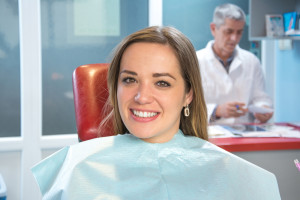 The best form of oral care is preventing dental problems from occurring. A major component of maintaining a healthy mouth is staying on top of daily habits like brushing and flossing. You should also be sure to see your dentist regularly, for scheduled checkups. You should see your dentist two times each year for routine exams. Your oral health is about more than just your teeth, though – you should also ensure that your gums are healthy. If you notice problems with your teeth, or your gums, delaying treatment could allow problems to worsen. (more…)
The best form of oral care is preventing dental problems from occurring. A major component of maintaining a healthy mouth is staying on top of daily habits like brushing and flossing. You should also be sure to see your dentist regularly, for scheduled checkups. You should see your dentist two times each year for routine exams. Your oral health is about more than just your teeth, though – you should also ensure that your gums are healthy. If you notice problems with your teeth, or your gums, delaying treatment could allow problems to worsen. (more…)
Dental Improvements To Your Appearance
 Your oral health is the chief concern of your dentist. That being said, your dentist can also be an ally in your quest to improve how your teeth look. Cosmetic dentistry can make beneficial changes to your smile, with a number of treatments available. Worried that your teeth are not as white as they used to be? Are you dissatisfied with the shape, or the alignment of your teeth? Your dentist can help guide you through what can be done to leave you satisfied with your smile. (more…)
Your oral health is the chief concern of your dentist. That being said, your dentist can also be an ally in your quest to improve how your teeth look. Cosmetic dentistry can make beneficial changes to your smile, with a number of treatments available. Worried that your teeth are not as white as they used to be? Are you dissatisfied with the shape, or the alignment of your teeth? Your dentist can help guide you through what can be done to leave you satisfied with your smile. (more…)
What To Expect From A Cavity Treatment
 So you have a cavity – what comes next? The treatment administered for a cavity will depend on the severity of the cavity, which typically depends on how long the cavity has had to progress on your tooth. At the outset, a cavity forms on your enamel. This decay occurs because bacteria in your mouth secrete acids when they break down sugars left on your teeth. If it is not stopped at your enamel, it will continue to spread until it reaches the center of your tooth, the pulp. (more…)
So you have a cavity – what comes next? The treatment administered for a cavity will depend on the severity of the cavity, which typically depends on how long the cavity has had to progress on your tooth. At the outset, a cavity forms on your enamel. This decay occurs because bacteria in your mouth secrete acids when they break down sugars left on your teeth. If it is not stopped at your enamel, it will continue to spread until it reaches the center of your tooth, the pulp. (more…)
The Link Between Diabetes and Gum (Periodontal) Disease
NOVEMBER IS AMERICAN AND NATIONAL DIABETES MONTH: Diabetes is one of the leading causes of disability and death in the United States. It can cause blindness, nerve damage, kidney disease, and other health problems if it’s not controlled.
One in 11 Americans have diabetes — that’s more than 29 million people. And another 86 million adults in the United States are at high risk of developing type 2 diabetes.
The good news? People who are at high risk for type 2 diabetes can lower their risk by more than half if they make healthy changes. These changes include: eating healthy, increasing physical activity, and losing weight.
People who have periodontal disease present a much higher risk for diabetes, and once diabetes has been diagnosed, it is essential to keep periodontal disease in check. Dr. Koshki urges all of his friends, family and patients to see their physician for annual physicals including a screening for diabetes.

Can I Brush Too Much?
Dr. Koshki is often asked this question. We turn to our friends at Delta Dental to help us answer:
Watch out for too much of a good thing!
Brushing regularly is considered vital for healthy teeth and gums, but dental experts warn that you can overdo a good thing. Known as “toothbrush abrasion,” over brushing can lead to sensitive teeth and receding gums.
Vigorous brushing can wear down the enamel on the teeth as well as damage and push back the gums, exposing the sensitive root area. Receding gums can also lead to other dental problems such as periodontal disease and cavities on the roots of the teeth and may lead to the need for treatments such as fillings, root canals and tooth extraction. According to the Wall Street Journal, dentists estimate that between 10 to 20 percent of the population have damaged their teeth or gums as a result of over brushing.
The people most at risk for tooth or gum damage from over brushing are those who are particularly diligent about their oral care and those who use medium- or hard-bristled toothbrushes. Other factors, such as a genetic predisposition to receding gums, clenching or grinding your teeth or having had your teeth straightened with braces, can increase your risk for damage from over brushing.
Brushing vigorously isn’t necessary to remove plaque. “Plaque is so soft that you could remove it with a rag if you could reach all the surfaces where it hides,” says Dr. Kevin Sheu, managing dental consultant for Delta Dental. “Thoroughness is what is required for plaque removal, not aggressive brushing. You’re not going to achieve any extra benefit by brushing hard.”
Changing brushing habits can usually stop the problem from getting worse. In cases of severe toothbrush abrasion, Dr. Koshki can fill in the grooves with bonding material.
Dr. Koshki and his hygienists recommend soft bristle toothbrushes, or better yet, use a DiamondClean by Philips Sonicare for the most thorough yet gentle teeth cleaning action available.

OCTOBER is Breast Cancer Awareness Month
October is Breast Cancer Awareness Month, which is an annual campaign to increase awareness of the disease. While most people are aware of breast cancer, many forget to take the steps to have a plan to detect the disease in its early stages and encourage others to do the same.
Dr. Koshki encourages monthly self examinations, frank discussions with your physician and timely mammograms. A healthy lifestyle is vital and to help, Dr. Koshki is offering $20 off of our Sonicare DiamondClean – Pink Edition during the month of October.

CRP Training Is For Everyone
Dr. Koshki and his Team have just completed their biennial CPR and Basic Life Support training and re-certification. It’s important for all healthcare providers to be prepared to handle a medical emergency, in fact, it’s the law. Dr. Koshki urges all of his friends and patients to get their certification too.
CPR saves lives. More than 300,000 people have cardiac arrests in the United States every year. Sudden cardiac arrest occurs when an electrical rhythm problem occurs and the heart is no longer able to pump blood effectively to the rest of the body. You might see a person suddenly collapse, lose consciousness, and stop breathing. The longer the body goes without circulation, the lower the chance of survival. By performing CPR, you are able to help the person’s blood keep circulating until an ambulance arrives and more advanced tools can be used. We know that the chance of surviving a sudden cardiac arrest increases significantly, by more than double, when CPR is started early. Contact the American Heart Association or Red Cross for CPR certification – your training could save the life of someone you love.








